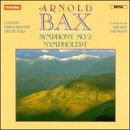| All Artists: Bax, Thomson, Lpo Title: Symphony 2 / Nympholept Members Wishing: 0 Total Copies: 0 Label: Chandos Original Release Date: 1/1/2000 Re-Release Date: 10/28/1992 Genre: Classical Styles: Forms & Genres, Theatrical, Incidental & Program Music, Historical Periods, Modern, 20th, & 21st Century, Symphonies Number of Discs: 1 SwapaCD Credits: 1 UPC: 095115849323 |
Search - Bax, Thomson, Lpo :: Symphony 2 / Nympholept
 | Bax, Thomson, Lpo Symphony 2 / Nympholept Genre: Classical
|
Larger Image |
CD DetailsSimilar CDs
|
CD ReviewsBax's Grim Vision Thomas F. Bertonneau | Oswego, NY United States | 10/06/2000 (5 out of 5 stars) "Like his First, Sir Arnold Bax's (1883-1953) Second Symphony (1925) in E-Minor and C reflects his emotional involvement in the disaster of the Irish insurrection of Easter 1916, and, more generally, his consternation and sorrow over the greater war of 1914-18 of which the events in Dublin were, in the number of victims, but a minor chapter. As the sequence of key-signatures (E-Flat for the First and E-Minor, but also C, for the Second) suggests, the later Symphony poignantly revisits the symbolic territory of its precursor, actually ratcheting up the perfervid angst and wounding nostalgia. The First Symphony began life as a piano sonata, but soon demanded the full armory of instrumentation. The Second uses the largest orchestra called on by any Bax score, including orchestral piano and back-up organ, as well as a large percussion battery. The occasional bi-tonality of the First becomes in the Second an omnipresent source of anguish and ambivalence. The Second Symphony has been recorded three times: by Myer Fredman (1972 on Lyrita); by Bryden Thomson (1987 on Chandos); and by David Lloyd-Jones (1998 on Naxos). How do the three recordings stack up against one another? All three are good, but only the Thomson appears to be currently available. (Can the Naxos Second really be out of catalogue? Amazon does not currently list it.) Consider how, in the First Movement, Thomson lets the bass-register "growl" in the orchestra emerge, as out of some fusky distance, into our perception; he also makes clear the rapid succession of motifs, culminating in a tonally ambiguous bit of bluster for the horns, that supplies the substance not only of this movement but of the symphony as a whole. Articulation from one section to the next is often the trick in pulling off a Bax symphony successfully. Lloyd-Jones probably does a slightly better job than Thomson, but Thomson's sense of Bax's color is superior. Peter Pirie once called Bax's Second a study in "darkness [and] disruptive ferocity... [an] entirely personal vision related to the First Symphony." So it is here, in Thomson's interpretation. The Andante of the Symphony's middle section offers some respite, with Arcadian musings from flute and harp, after the turmoil of the preceeding section. The mood of the Finale returns to that of the First Movement, but trails its anger away into a subdued but grim dénouement. The other item on this program is "Nympholept," after Swinburne. This is one of the best of Bax's luxurious tone-poems from the teens of the twentieth century." Apocalyptic Bax K. Farrington | Missegre, France | 04/30/2000 (5 out of 5 stars) "The Greek etymology of the word 'apo-caly-psis' means an uncovering of something hidden, in effect a revelation. This term seems particularly appropriate to this incredibly powerful work. Bax has begun his symphonic oeuvre with a shortish and blazing First Symphony which he had entitled with characteristic humor, 'Adventures on the Precipice'. This second sortie investigates some of the same material of introspective nightmare and confusion which he described (in the same quote as) 'In the Abyss'. The first recording of this work I came across was the Lyrita recording of 1971 with Fredman conducting the LPO made in association with Ken Russell Productions. For me, this vinyl recording was a milestone in my listening history. I still recall the 'Stereo Release' broadcast on Radio 3 that Saturday morning in November 1971 when I listened enthralled and appalled that such amazing music was not better known ( I was more naive then and thought that it was the music that mattered alone on a works popularity!). Therefore this newer Digital CD recording had a lot to live up to. To my surprise and delight, Thomson does all this and more with the sparkling recording highlighting all those tonal nuances that Bax treated his listeners with at this time of his career. The impression of this work as a totality is of an ancient saga involving elements of strife, adventure, adversity, cold and merciless beauty, love tied to a dreamy celtic landscape blown by gales and finally a terrifying destruction which is ended by an Epilogue that is uncertain as to what comes next. As ever, Bax gives us universals and we hear no guns or shells in his music as, for example in the first movement of Rubbra's First Symphony. In so doing, Bax is almost uncanny in his musical depiction of nuclear devastation and a landscape of unknown destruction: have we survived this? It must be remembered that the Atomic Bomb was not invented until nearly 20 years later! Thomson gives us every detail of this horrifying tapestry with those all-important Bax horns taking first prize in the call to arms that lead us to this battlefield of the mind, set under boiling gray skies with a poignant lyrical episode under a midnight moon blown by gentle waves of orchestral color. The second movement has one of Bax's best themes played by solo violin which gives us love in the midst of destruction, love as a solace from horror and violence which closes down into the enormous tsunami of the finale with pagan organ on top of orchestra fff, dying down to the querying yet not moribund epilogue. This work is the best he could do and must have 'knocked the socks' off his first audience! My friend from NH, a real character, plays the towering arch of the opening of the finale at full volume to trip out. Try it! Press the 'Order Now' field and get it sent over ASAP! Mind altering substances become redundant if you have a copy of this work. Believe me! Nympholept is Bax in his best fairy mood and its inclusion on this disk makes this not just a musically brilliant CD but a bargain collection too."
|

 Track Listings (4) - Disc #1
Track Listings (4) - Disc #1

